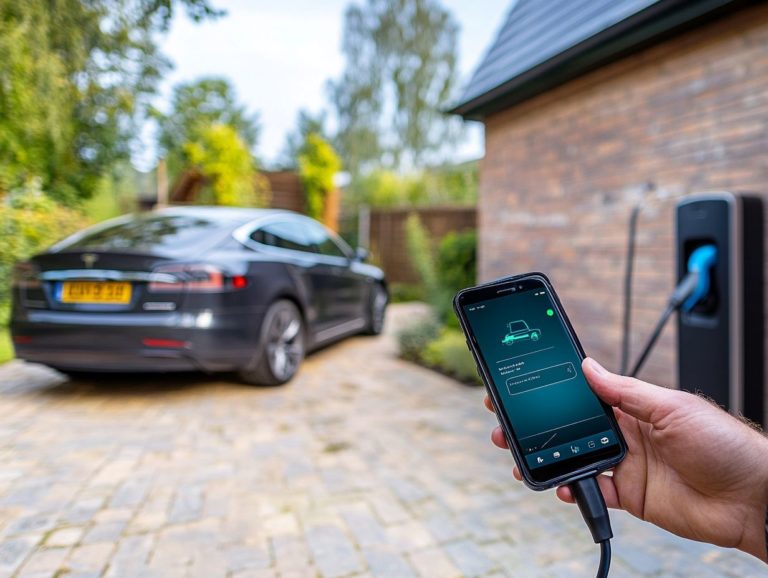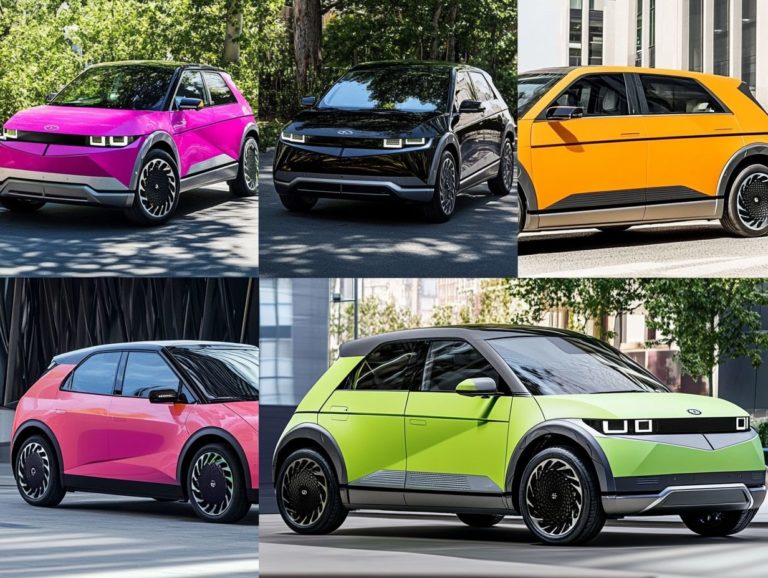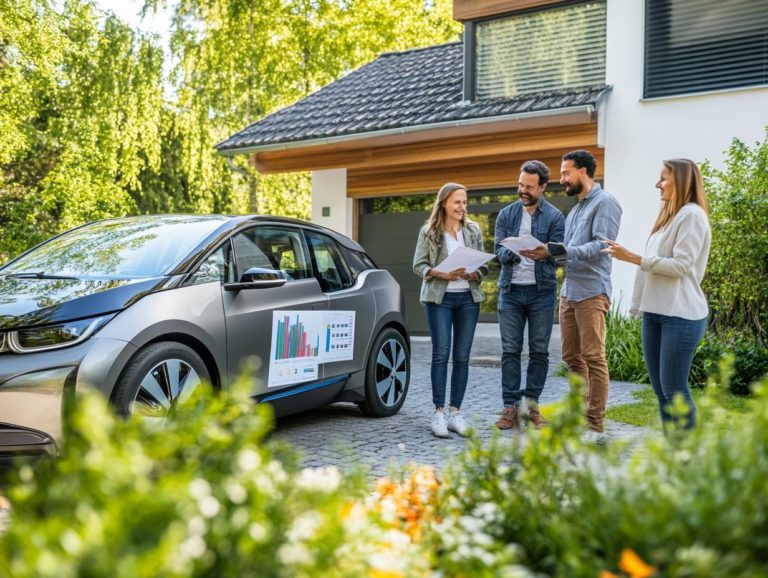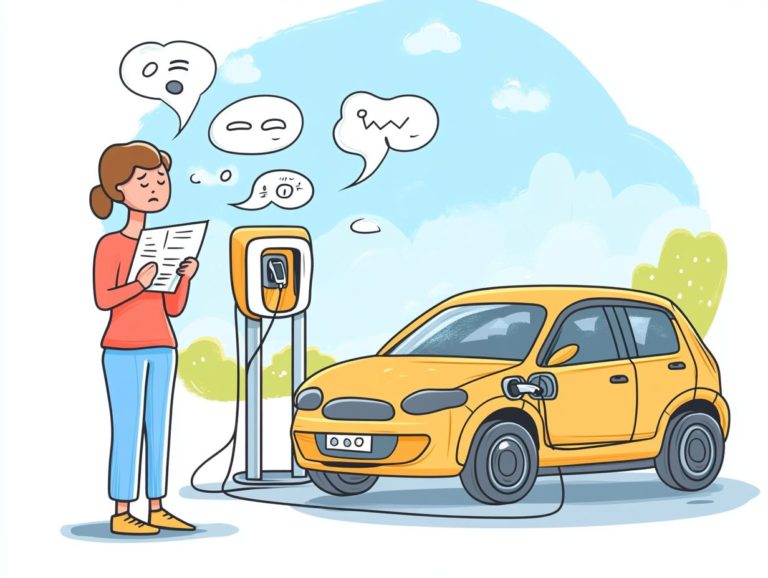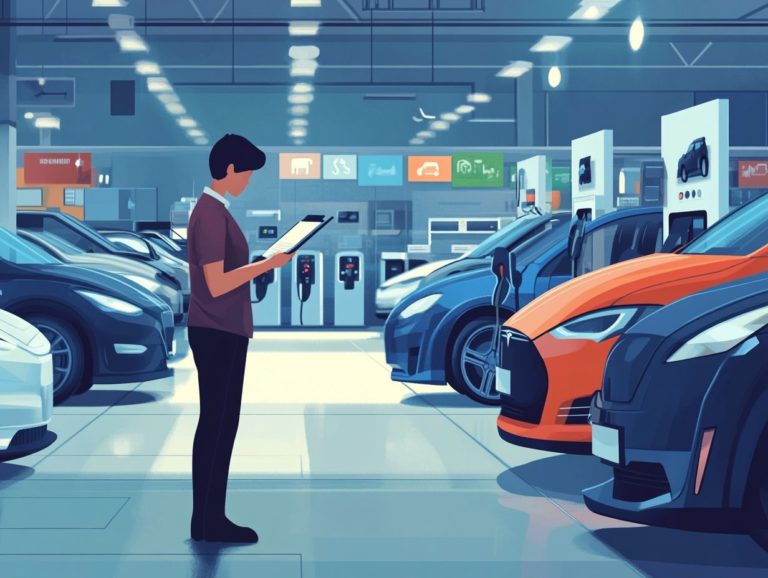The Pros and Cons of Buying Used EVs
As the shift toward electric vehicles gathers pace, you may find yourself contemplating the purchase of a used electric vehicle (EV). Buying a used electric vehicle offers savings and environmental benefits. However, it also comes with unique challenges.
You’ll discover numerous benefits, including cost savings and a reduced carbon footprint. At the same time, consider crucial factors such as battery life and places where you can charge your car. It s essential to weigh the potential drawbacks. We ll offer practical tips to help you make an informed decision.
Whether you’re an eco-conscious driver or simply in search of your next ride, understanding the nuances of used EVs is vital for your journey ahead.
Contents
- Key Takeaways:
- Benefits of Buying a Used EV
- Reduced Environmental Impact
- Key Factors to Consider When Buying a Used EV
- Potential Drawbacks of Buying a Used EV
- Tips for Buying a Quality Used EV
- Frequently Asked Questions
- Why Choose a Used Electric Vehicle?
- What are the disadvantages of buying a used EV?
- Can I still qualify for tax incentives when buying a used EV?
- Are there any potential safety concerns when buying a used EV?
- Do used EVs have the same level of performance as new ones?
- What should I look for when buying a used EV?
Key Takeaways:
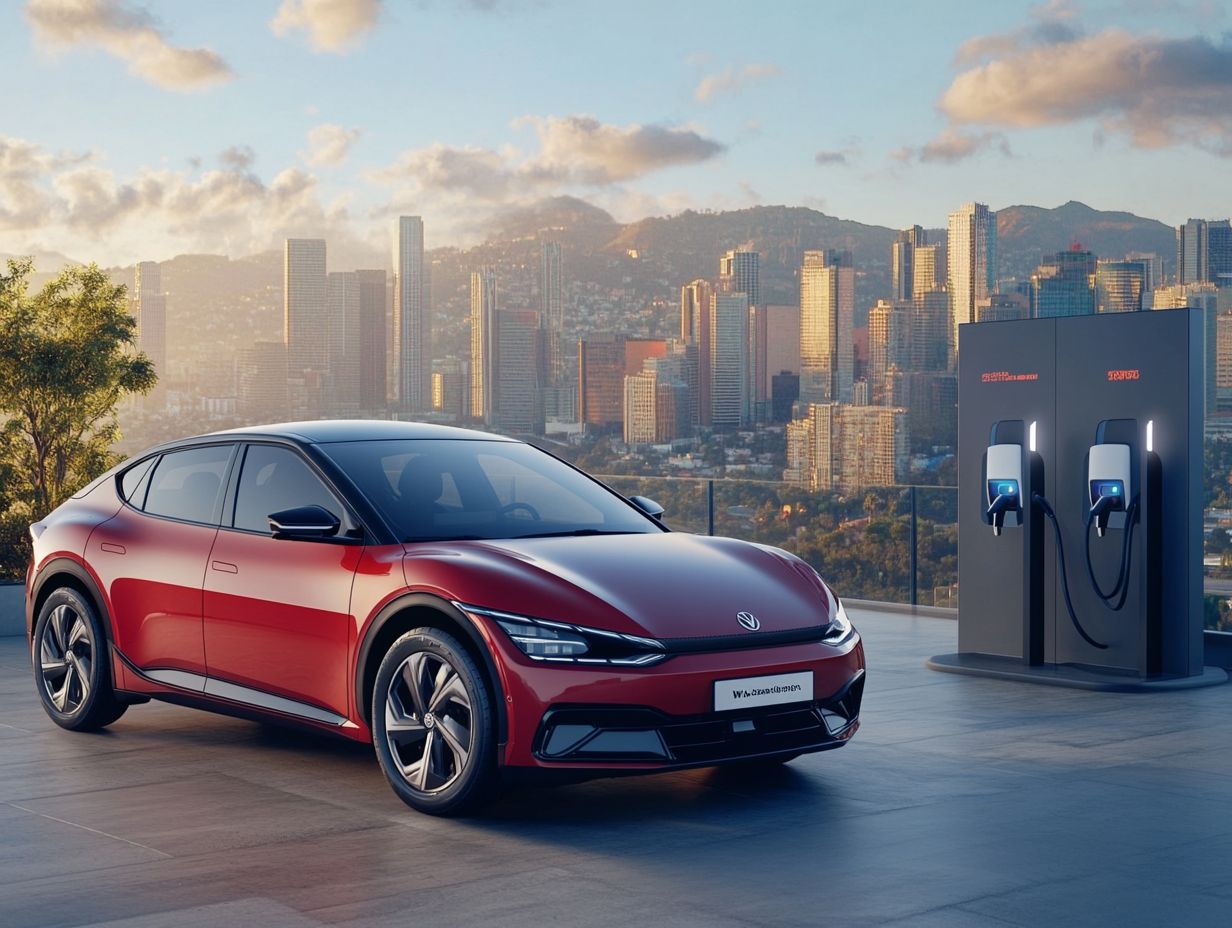
- Save money and reduce your environmental impact by buying a used EV.
- Consider battery life and charging options before purchasing.
- Research model options and dealer reputation for a quality purchase.
What are Used EVs?
Used electric vehicles (EVs) are essentially pre-owned models that have had their share of the road with previous owners. These cars hail from manufacturers like Tesla, Chevrolet, Nissan, and Hyundai, providing a sustainable alternative to traditional gasoline-powered vehicles. This shift is particularly significant given the rising environmental concerns and advancements in charging options.
In recent years, you may have noticed a remarkable surge in the market for used EVs. This change is fueled by increased consumer awareness and the growing allure of electric mobility. With an impressive average range of 150 to 300 miles on a full charge, these models are more than capable of handling your daily commute while simultaneously shrinking your carbon footprint.
Statistics indicate that used EVs typically cost much less than new models, making them a more accessible option for a broader audience. Battery health has also seen notable improvements, with many manufacturers offering warranties that ensure battery performance and longevity, enhancing their attractiveness even further.
The rising adoption of electric vehicles isn’t just a fleeting trend; it’s a decisive move toward responsible consumption and energy efficiency.
Benefits of Buying a Used EV
Buying a used electric vehicle (EV) can truly elevate your driving experience and save you money! You ll enjoy lower upfront costs, the opportunity to tap into various incentives for used EVs, and substantial savings on maintenance and fuel expenses compared to traditional vehicles.
Cost Savings
One of the most compelling reasons for you to consider purchasing a used electric car is the significant cost savings it can offer compared to new models, especially when it comes to EV pricing and available tax credits. With the average price for used EVs being notably lower, you can take full advantage of federal incentives that further reduce your overall expenses.
To put it into perspective, Kelley Blue Book indicates that the average price for a new electric vehicle hovers around $55,000, while used EVs can often be found for as little as $25,000. That s quite a difference, making used vehicles a far more appealing choice for those mindful of their budgets. Additionally, many states provide extra tax credits that can be combined with federal incentives, pushing your potential savings to a total of up to $7,500 for eligible purchases.
Consider a case study from Edmunds that reveals buyers opting for a two-year-old Tesla Model 3 save around $10,000 compared to its brand-new counterpart. This not only highlights the financial advantages of buying used but also underscores the opportunity to make a sustainable choice for the environment.
Reduced Environmental Impact
The environmental impact of transitioning from gasoline-powered vehicles to used electric cars is truly remarkable. By choosing a used electric vehicle, you play a significant role in reducing greenhouse gas emissions and fostering cleaner air. This is especially true as the charging infrastructure continues to improve and expand.
This shift not only lessens reliance on oil and gas but also leads to considerable decreases in urban air pollution levels. Research shows that adopting electric vehicles, including used models, can result in an impressive reduction of up to 50% in CO2 emissions over their lifetime compared to traditional cars.
The rapid increase in charging stations over 60% growth in the last three years in many areas further supports this transition. As a result, you have the power to make environmentally friendly choices, knowing that convenient charging solutions are readily available, enhancing your journey toward a sustainable future.
Key Factors to Consider When Buying a Used EV
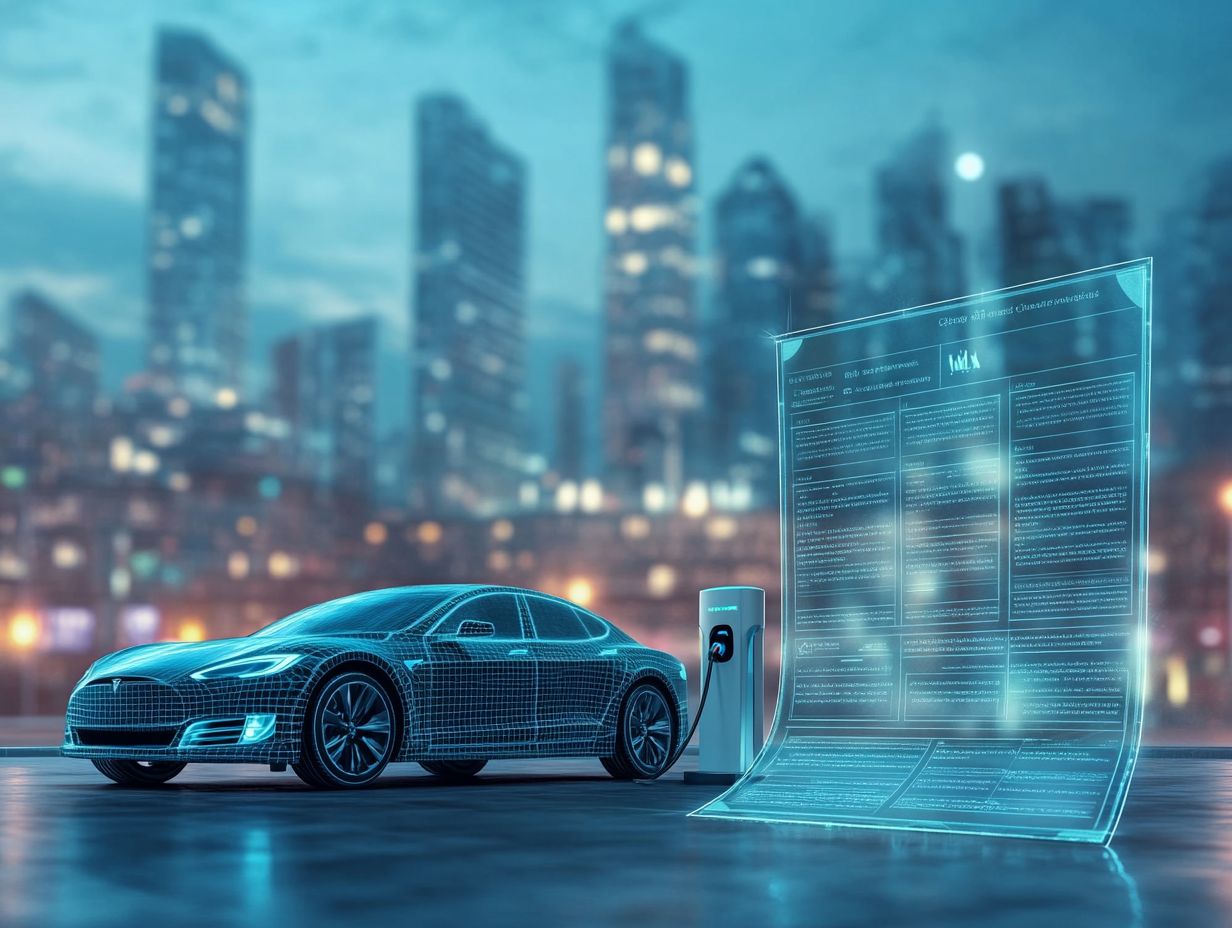
Before you embark on the journey of purchasing a used electric vehicle (EV), it s vital to thoughtfully evaluate several factors that will greatly influence your overall experience and satisfaction.
Key considerations should include:
- assessing battery health,
- scrutinizing the vehicle’s history, and
- confirming the availability of charging stations in your vicinity.
These elements are essential for ensuring the longevity and practicality of your EV.
Battery Life and Maintenance
Battery care is key to a rewarding EV experience. Battery life is a crucial aspect to consider when evaluating a used electric vehicle, as it directly impacts both performance and maintenance costs.
Understanding how battery health influences EV drop in value is vital for making a well-informed purchasing decision. Experts agree that a well-maintained battery not only extends the vehicle’s lifespan but also plays a key role in reducing unexpected repair expenses.
For example, organizations like Cox Automotive note that when battery capacity deteriorates, it often results in a sharp drop in resale value. Insights from Edmunds emphasize the importance of closely examining battery warranties and health reports. These elements can significantly affect your long-term ownership costs.
Being knowledgeable about battery health can save you thousands in repairs and enhance the vehicle’s overall value in the used market.
Availability of Charging Stations
The availability of charging stations is a crucial factor for you as a used EV buyer, shaping the practicality of owning an electric vehicle. As the charging infrastructure expands, it s increasingly important to understand the range the distance your vehicle can travel on a single charge of your chosen model, ensuring you can conveniently charge during your daily commute.
For many potential buyers like yourself, the decision to invest in a used EV often hinges on the presence of reliable charging options in your neighborhood or along your typical travel routes.
Different charging solutions, such as fast chargers in public spaces and Level 2 home installations, play an essential role in this equation. They directly impact the convenience and feasibility of maintaining your electric mobility.
A well-developed network of charging stations not only alleviates range anxiety but also motivates prospective buyers to make the switch from traditional vehicles. The connection between charging accessibility and vehicle range ultimately influences not just your individual choice, but also the broader market dynamics for electric vehicles.
Potential Drawbacks of Buying a Used EV
When purchasing a used electric vehicle (EV), you’ll find an array of advantages, but it’s equally important to weigh the pros and cons of EV ownership.
As a buyer of a used EV, you may encounter challenges such as drop in value, a limited selection of models and features, and the uncertainty surrounding the previous ownership and maintenance history. These factors can add layers of complexity to your buying experience.
Limited Model and Feature Options
One of the challenges you may encounter as a used EV buyer is the limited selection of model options and electric vehicle features compared to the new car market. This limited options can influence your decisions regarding brand, design, and technology.
For instance, you might find that the technological differences between models play a significant role in shaping your preferences. When comparing options like the Tesla Model 3 and the Chevrolet Bolt, you may notice that the Model 3 offers advanced autopilot capabilities and a minimalist interior that caters to the tech-savvy.
On the other hand, the Bolt presents a more budget-friendly choice, focusing on practicality and efficiency. With a smaller pool of used models to choose from, you may feel pressured to compromise on your ideal specifications.
Therefore, it s crucial to carefully weigh the pros and cons of each option before making a decision.
Uncertainty of Previous Ownership and Maintenance
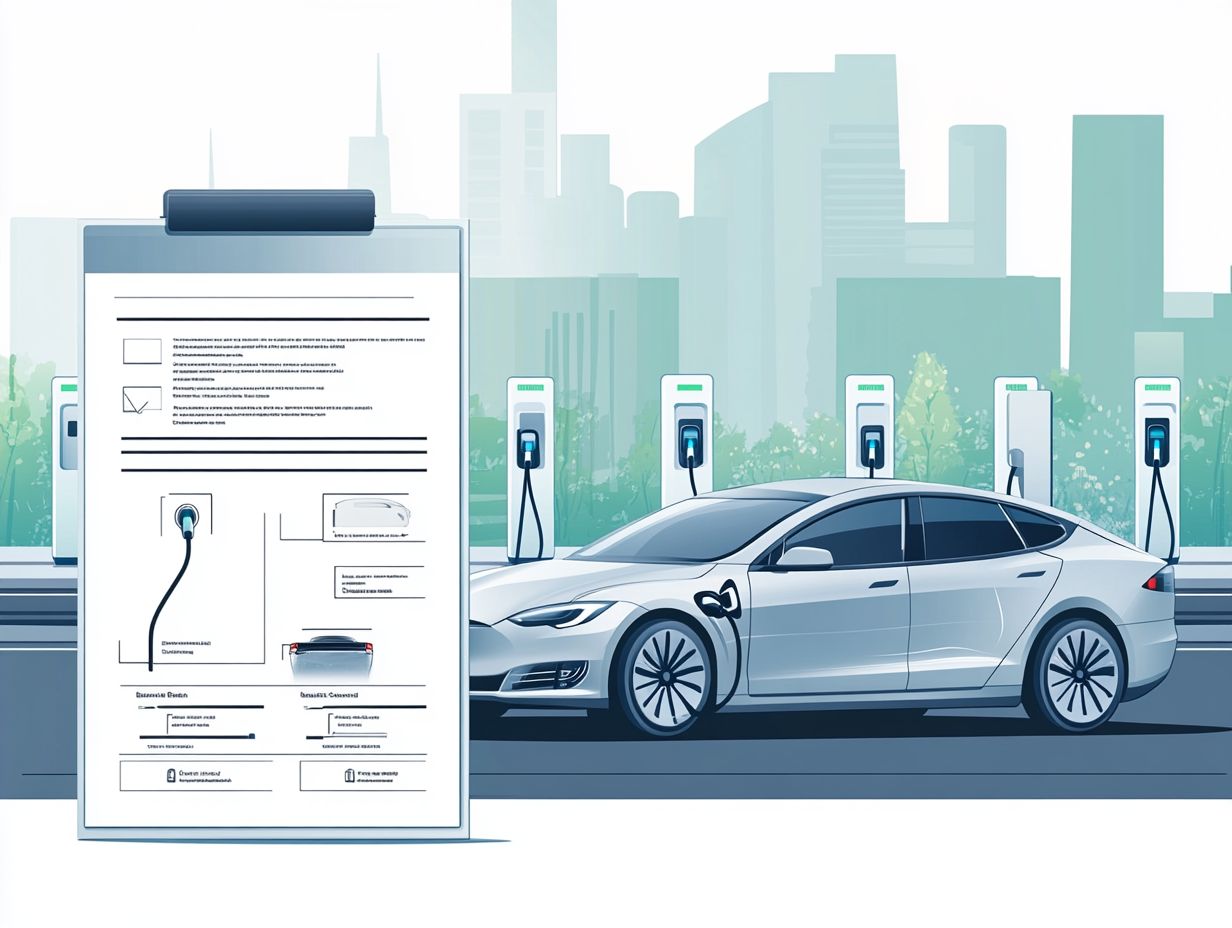
Uncertainty about a used electric vehicle’s previous ownership and maintenance history can present significant challenges for you as a buyer. This uncertainty affects your future maintenance costs and understanding of the vehicle s condition. It’s essential to assess how this aspect influences EV depreciation and potential resale value.
When you overlook these critical details, you risk investing in a vehicle that may harbor hidden issues, leading to costly repairs down the road. Without a comprehensive vehicle history report, you may not fully grasp how past ownership affects battery performance and overall efficiency. Unrecorded maintenance or a lack of it can drastically change not only your immediate driving experience but also your long-term servicing expenses.
A thorough review of the vehicle s history empowers you to make informed decisions. This not only protects your financial investment but also allows you to appreciate the true value of the electric vehicle in a competitive market.
Tips for Buying a Quality Used EV
To secure a successful purchase of a quality used electric vehicle (EV), you should adhere to several essential tips that will elevate your buying experience.
Start by conducting thorough research and meticulous inspections of the vehicle. Collaborating with a reputable dealer is also crucial, as it gives you the power to make a well-informed decision that aligns with your needs and expectations.
Research and Inspection
When you’re considering the purchase of a used electric vehicle, thorough research and inspection are absolutely essential. These steps will uncover vital information about the vehicle s history and condition, helping to ease any concerns about EV depreciation and ensuring the long-term reliability of your investment.
To conduct effective research, make sure to leverage vehicle history reports from trusted sources like Carfax or AutoCheck. These reports reveal details about previous accidents, title issues, and service records that could impact your decision.
During your physical inspection, don t forget to evaluate the tire wear, brake responsiveness, and the condition of the charging ports. Keep an eye out for any signs of corrosion, as these could indicate larger issues. It s equally important to ask about the vehicle’s battery health this is a critical aspect of any EV. Many sellers will have documentation from systems that monitor battery performance to provide insights into the state of charge and overall capacity.
Investing time to meticulously examine both the technical and aesthetic elements of the vehicle ensures that your decision to buy a used electric vehicle is not only informed but also sound.
Working with a Reputable Dealer
Partnering with a reputable dealer can elevate your experience as a used electric vehicle buyer, granting you access to reliable information and steadfast support throughout the purchasing journey. Esteemed dealers are well-versed in the federal incentives available for electric vehicles, helping you maximize your savings.
Working with a reputable dealer simplifies the often daunting intricacies of the used EV market and fosters a foundation of trust. Experienced dealers know the ins and outs of different models, specifications, and available technologies, allowing them to connect you with the best options tailored to your unique needs.
By leveraging their expertise, you can navigate the myriad of choices confidently while reaping the benefits of potential tax credits and rebates opportunities that might otherwise slip through the cracks without professional guidance.
Watch this video to learn more about the benefits and considerations of buying a used electric vehicle.
Frequently Asked Questions
Why Choose a Used Electric Vehicle?

1. Lower cost: Used EVs are typically more affordable than brand new ones, making them a great option for budget-conscious buyers.
2. Reduced depreciation: EVs have a lower depreciation rate compared to traditional gas-powered cars, so buying used means you can save more money in the long run.
3. More options: Since EVs have been around for several years now, there is a wider selection of used models available compared to when they were first introduced.
What are the disadvantages of buying a used EV?
1. Limited battery life: The battery life of a used EV may not be as long as a new one, which can result in reduced range and performance.
2. Lack of warranty: Most used EVs do not come with a warranty, meaning you may have to pay for any repairs or maintenance out of pocket.
3. Limited charging infrastructure: Depending on the age of the used EV, there may be limited charging options available, making it difficult to find a charging station when needed.
Can I still qualify for tax incentives when buying a used EV?
Yes, you may still be eligible for federal and state tax incentives when purchasing a used EV. However, the amount may be lower compared to buying a new one.
Are there any potential safety concerns when buying a used EV?
As with any used vehicle, there is always a risk of safety issues, such as worn-out tires or brakes. Make sure to inspect the vehicle thoroughly and have a certified mechanic check it before making a purchase.
Do used EVs have the same level of performance as new ones?
It depends on the age and condition of the used EV. A well-maintained used EV can still provide excellent performance, while an older model may not have the same capabilities as a new one.
What should I look for when buying a used EV?
Some important factors to consider when buying a used EV include the age, mileage, battery life, charging options, and any potential safety concerns. It’s also crucial to research the vehicle’s history and have it inspected by a qualified mechanic.
In conclusion, buying a used electric vehicle can offer numerous benefits, including cost savings and a wider range of options. By working with a reputable dealer and conducting thorough research, you can make an informed decision that meets your needs.

